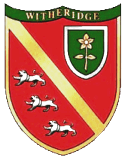

|
A Story from the South Molton County Court In Victorian days, and into this century, it was the custom of local newspapers to cover court proceedings, often in great detail: sometimes verbatim accounts were given. These provided entertainment for their readers and opportunities not only for miscreants to be exposed, but also for local hostilities between individuals to be fought out in public. One such battle took place in the Courts in South Molton in the first half of the year 1912. Under the headline "Witheridge Farmers Dispute" the South Molton Gazette of February 24th 1912, reported a case in which George Cock, of West Yeo Farm, Witheridge, charged George Selley, butcher, and owner of Hellingshayes Farm, and his son Francis, with "trespassing in pursuit of conies" on West Yeo Farm on January 18th. Both employed counsel and the defendants pleaded not guilty. It was claimed that about midday on January 18th George Cock heard firing and saw George Selley standing beside a hedge dividing their two farms. A rabbit bolted and George Selley shot it. Cock approached the hedge, which he had always believed to be his and spoke to Selley senior, who denied damaging the hedge or ferreting in it and left the scene. Cock remained and saw a rabbit bolt followed by a ferret, which he caught and took home. The following week he received a letter from Selley's solicitor asking for the return of the ferret. Cock told the court that he owned the hedge, and this was supported by two local witnesses, one of whom stated that he kept up the hedge at Cock's order. The defence however claimed that the Selley's were the owners of the disputed hedge, and their counsel sought to undermine the prosecution by reminding the court that if it could be shown that they had even the slightest ground for the title, then the court had no jurisdiction. George Selley claimed that the "fence" was his, he had rabbited it every winter for 13 or 14 years, and George had a grudge against him. He also told the Court that he was a churchwarden for the parish of Witheridge. (The property was in Worlington). The defence called witnesses to aver that the hedge was always part of Hellingshayes. The magistrates, perhaps baffled by the contradictory evidence, and relieved to find a way out, dismissed the case on the grounds that they had no jurisdiction. But this was not the end of it, for the case was then scheduled for a judge and jury, and the jury were instructed to view the hedge, and in April they came out the nine miles from South Molton to inspect the scene of the alleged crime. In June they were all back in court and at it again. Counsel for George Cock said there had been no dispute about ownership until January. He regretted that they "could not call the man who had made the hedge because he was dead, but they could call the man who saw him do it, and for whom it was made." He said "there was a presumption that when a man went to make a boundary or bond fence, he did it by standing at the extreme limit of his own land, taking the earth, and throwing it back on his own land so that the fence belonged to the man on whose side the ditch was not". In case this was not clear, Counsel told the jury that "to some extent there was a ditch on both sides", and that he was sure that they were capable of judging whether a man who claimed a hedge would go away and leave a ferret in it, and that only a man in a temper would have come and cut down the hedge timber before its time as Mr Selley had recently done. A former tenant of Hellingshayes, Mr Pugsley, had said the hedge was Mr Cock's. Mr Selley then took the stand and told the jury that "all the witnesses on the other side were telling lies". He was supported by five witnesses, including the rector of Meshaw. When the judge asked Mr Selley why, if the hedge was his, he had not repaired it, he received no answer. Mr Selley's counsel in summing up offered joint ownership of the hedge as a solution. This was ridiculed by counsel for Mr Cock, who asked, what was a right in common in a hedge? Did they imagine two farmers standing a little distance apart and throwing clods at each other until a bank was made in between?" (Laughter in Court)" The jury were out for two hours, and then reported that they could not agree. They retired again and on their return found in favour of Messrs Cock, with costs against Mr Selley and damages of 40 shillings. Comments on the expenditure of public and private time and money on this case was summed up in the words of George Cock's brother, who, although a joint prosecutor, wrote to the court as follows: "If my opinion had been asked I should have not thought of going to law, but should try to square matters over a glass of grog and a cigar" South Molton Gazette's Feb 24th, April, 20th, June 22nd, 1912 Previous Last Edited 03/07/2006 Copyright © 2000-2006 Witheridge Unless otherwise indicated on the page in question, the photographic images reproduced on this site belong to the Witheridge Archives, and, as such may not be reproduced for commercial purposes without written permission. However, you are welcome to use any of the photographs belonging to the archive for personal and/or non-commercial use. Any material shown as not being owned by the archive may not be reproduced in any form without first receiving written permission from the owner of the material in question. |

